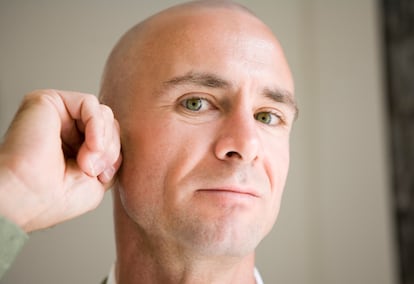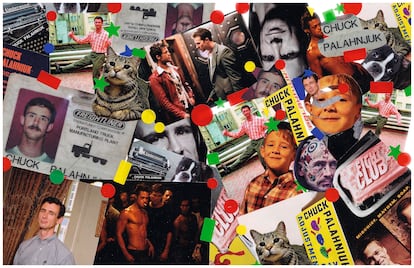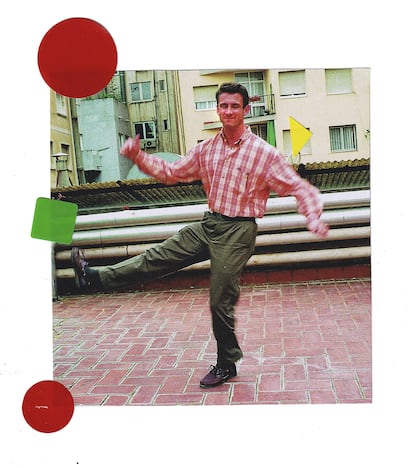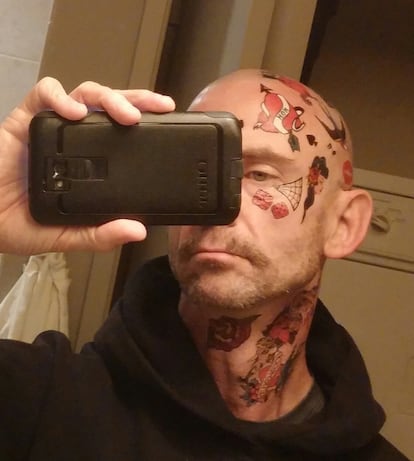‘Fight Club’ author Chuck Palahniuk reflects about his life: From building his own castle to making the audience faint
At 60, the acclaimed author has learned a lot about his craft, and even more about living

The Covid-19 pandemic divided the world in two: those who tackled personal projects, taking advantage of the collapse, and those who later regretted not having done so. For Chuck Palahniuk, 60, confinement was not as problematic – after all, a writer needs a certain degree of isolation in order to concentrate – as the closing of the gyms. Suddenly, he had no way of working up. So, he set himself a new routine: building a castle with his bare hands on top of a cliff outside of Portland. He chuckles as he recalls: “I changed a completely abstract activity in the gym for lifting rocks weighing more than 40 pounds. I started with a simple room and before I knew it I was making windows, niches for statues, a patio... There it is, without ceilings, like a strange uninhabitable fantasy.” During those months, he took on something he had been avoiding: teaching and preparing a manual for aspiring novelists: Consider This: Moments in My Writing Life After Which Everything Was Different (Grand Central Publishing).

Question. You start this book by saying that you never wanted to write it. What made you change your mind?
Answer. Before publishing Fight Club, I used to work on a truck assembly line. There were so many of us journalists in that company that we joked that they should teach welding during the career. Then I signed up for the writing workshop of Tom Spanbauer [author of The Man Who Fell in Love with the Moon] and everything changed. I owe him a lot of what I know. Thanks to him, I was able to develop my career. And since Tom is not in good health and was never going to write this book, I owed it to him.
Q. Tom Spanbauer created the concept of “dangerous writing,” which you practice. What is it about?
A. It’s about exploring something threatening and unresolved in your life, overcoming fears from painful personal truths.
Q. What advice, as a writer, would you have given to yourself as a young person?
A. Relax. You need to take your time to publish something that matters; you only have one first novel.
Q. In your case, it was Fight Club. You did take your time… you wrote it when you were 33.
A. I was still young, wasn’t I? [Laughs]
Q. How did you manage to keep grounded after its success?
A. It was not a success, on the contrary. During my first promotional tour, in Seattle two people showed up, and in San Francisco, nobody. And even though the film rights were acquired, nothing indicated that it would actually be filmed. When it was finally released, it lasted a couple of weeks in the theaters. By then, it had hardly been sold; almost all copies of the book remained in a warehouse. It wasn’t until Fox released it on DVD that it really found its audience.

Q. Is it true that after you were introduced to Brad Pitt on the set, you wanted to get his lips?
A. [Laughs] We all have our insecurities. I, for example, have been trying to hide my neck since I was a child. It’s too long. That’s why I always had my promotional photos taken with a turtleneck. But I hadn’t paid attention to my mouth until a friend told me: “Have you noticed how the attractive thing about Brad Pitt are his perfect lips?” They are very pronounced, very full. That made me self-conscious about mine; they are quite thin. I needed lips like those. So I called several cosmetic surgery offices to get information and tried one of those telemarketing-style inventions that do suction to achieve a fuller effect. It was a complete disaster. And I took the opportunity to write about it, of course.
Q. Why are you so keen on exploring the limits of the body?
A. Funny you should mention it, because I have realized that the stories that most attract me as a reader are those that include some physical element. And that is always present in my writing: it could be in violence, in sex, in drugs or in illness. Creating a very intense feeling of the character’s body generates a physical reaction in the reader.
Q. When would you say you moved on from your obsession with provoking?
A. The 1990s was the decade of transgressive novels. It started with American Psycho and continued with Trainspotting and Fight Club. Novels about bored kids who would try anything to feel alive. But everything changed with 9/11. Suddenly, anything transgressive was in danger of being accused of inciting terrorism, and publishers decided not to take legal responsibility for their authors. That is why there was such a strong revival of codified formulas of transgression, such as horror. I published my own horror trilogy: Lullaby, Diary and Haunted. I had to sharpen my wits to hide the message. I don’t see it as something bad; on the contrary, it forces the reader to exercise their intelligence to decode what you’re really telling them.
Q. You have a short story, Guts, about risky forms of masturbation that can end in tragedy. It is famous for causing fainting among the audience. Why do you like to read it in public so much?
A. Guts comes from true stories. I wrote it as a personal challenge, thinking about Shirley Jackson and her story The Lottery. When she published it in The New Yorker in the 1950s, the magazine lost subscribers; some people were very offended. I was obsessed with the idea: what would a story capable of amassing the same level of anger look like today? Reading it in public is the most humiliating thing I can do, because I have to put all my dignity aside. It is a message especially for the youngest: in order to create, the first thing you have to lose is shame – only then do you end up facing your own fears.

Q. Shirley Jackson’s daughter sold her mother’s ashes online, and gave you some. Where do you keep them?
A. They are too precious a relic to keep in my hands. I bought two beautiful wooden boxes from an antiques dealer, split them up and sent them to my agent and publisher. The truth is that I’m not particularly fetishist.
Q. In your book, you raise two unanswered questions: why are we so obsessed with stories about losers? Why do high culture tales end badly?
A. In most movies of my generation the good guys used to lose. Rocky lost, Rosemary gave birth to the devil’s son, Taxi Driver croaks, Carrie kills everyone and then herself, Midnight Cowboy ends terribly… Everyone goes after an ideal and loses the battle, although many persevere. Someone named this “romantic fatalism.” We had seen the failure of Vietnam, Nixon’s corruption, the environmental crisis... Nobody was going to go for a nice ending, we had to see the hero try and try and fail. The decline of the Summer of Love would give rise to the Me Generation of the 1970s and the yuppies of the 1980s. And so, we have remained in love with tragic endings until today.
Q. In 2018, you experienced a particularly difficult moment: you lost the income of your last years due to the embezzlement committed by your literary agency’s accountant. What was it like to suddenly find yourself in scarcity?
A. It was disturbing, but it helped me not to be so confident. In any case, I didn’t start writing for money, and it has never been my main goal. I’m not a big spender either. So, essentially, nothing changed. At that time, much worse things happened to me, like the death of my father-in-law from cancer.
Q. You have always been very discreet about your relationship with your husband, with whom you’ve been with for almost 30 years. But you now talk about it more openly. What has changed?
A. The death of my parents was decisive. I didn’t want to embarrass them when they were alive, because homosexuality wasn’t something they quite agreed with. Also, my husband feels more comfortable with it. In 2018, we were invited to the Rome Film Festival, and when I walked the red carpet we posed together and he hugged me from behind. It was a natural gesture that we don’t usually do in public.
Q. You’ve had no problem writing about your addiction to sedatives, but I read that you’ve given them up. What drove you to do it?
A. I started because I suffer from insomnia. I can spend weeks wandering sleeplessly. Then I discovered that they were a fantastic tool for writing in one sitting or for keeping up with the pace of promotional tours. Vicodin or Ambien were useful to turn my body into a machine that responded to the need to rest or to be awake when needed. Until I was invited to a cultural festival in Borelo, Palermo, and I got hammered mixing pills with booze. I ended up acting like a jerk in front of people I admire, like the writer John Irving. On my return to Portland, I was so embarrassed that I said to myself: never again.
Tu suscripción se está usando en otro dispositivo
¿Quieres añadir otro usuario a tu suscripción?
Si continúas leyendo en este dispositivo, no se podrá leer en el otro.
FlechaTu suscripción se está usando en otro dispositivo y solo puedes acceder a EL PAÍS desde un dispositivo a la vez.
Si quieres compartir tu cuenta, cambia tu suscripción a la modalidad Premium, así podrás añadir otro usuario. Cada uno accederá con su propia cuenta de email, lo que os permitirá personalizar vuestra experiencia en EL PAÍS.
¿Tienes una suscripción de empresa? Accede aquí para contratar más cuentas.
En el caso de no saber quién está usando tu cuenta, te recomendamos cambiar tu contraseña aquí.
Si decides continuar compartiendo tu cuenta, este mensaje se mostrará en tu dispositivo y en el de la otra persona que está usando tu cuenta de forma indefinida, afectando a tu experiencia de lectura. Puedes consultar aquí los términos y condiciones de la suscripción digital.








































